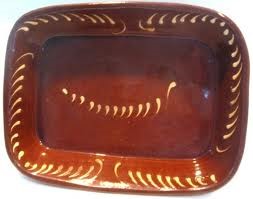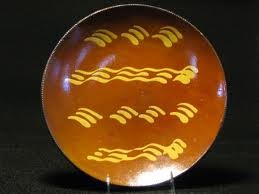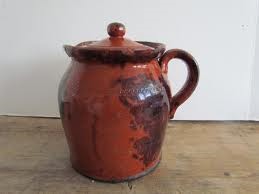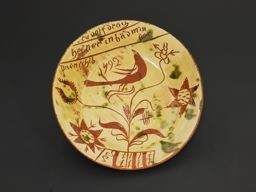John Trough was the only potter in Carlisle from 1806 through at least 1835. Trough (spelled Drach in German) was the son of Adam and Eve Drach of Haycock Township, Bucks County, Pennsylvania.1 Rudolph Drach, possibly John’s relative, was also a Bucks County potter, and several examples of his signed pieces are known.
It was likely the marriage of Hanna Drach (Trough) to Reverend Frederick Sanno, pastor of First Evangelical Lutheran Church of Carlisle, that brought Hanna’s brother John and their parents to Carlisle from Bucks County. John Trough and his wife Catharine moved to Carlisle in 1806.
In 1806, Trough purchased Lot #159 on South Hanover Street2 and worked out of the one-story log shop in back of his house. To supplement his income as a potter, Trough also kept a tavern. The 1826 tax assessment of Carlisle listed Trough’s occupation as an innkeeper with a pottery, one lot, a log and stone house, one cow, and one gelding.3
Trough was licensed to keep a tavern from 1816 to 1830. His 1827 license records the name of his tavern as the “Sign of the Cross Keys.” According to a Carlisle resident, “John Trough kept about the lowest house in the town. The dance room, frequented by such celebrities as John Henry and his wife “Peg,” the belle of the room, and the bar was upstairs and a pottery in the first story.”4
“It was in this house John McGlaughlin got drunk and went out on the pike and killed Swords by running a pitch fork through his head,” stated another old time Carlisle resident.5 George Swords was a single man who farmed in South Middleton Township near the head of the LeTort stream. He had in his employ, John McGlaughlin, a bad-tempered man who drank too much. Swords sent McGlaughlin to Carlisle on November 30, 1829 with a load of hay. When McGlaughlin was late in returning, Swords went out his road to the Pike where he met McGlaughlin turning into the road. They had words, and McGlaughlin took a pitchfork out of the wagon and ran it through Swords’ head. He left Swords dying on the frozen ground. McGlaughlin took the horse and wagon back to the barn, told Swords’ sister what he had done and went to his sister’s house in Carlisle where he was arrested the next day. He was tried at the January 30, 1830 term of court and sentenced to four years in jail. While in jail he developed dropsy. He returned to Carlisle when his sentence was up, but he died a few days later. Wesley Miles, a boy of 14, saw McGlaughlin in his coffin and was a witness at his funeral. He said “there were no ministers, no mourners, no tears, none.” George Swords’ brother, Peter, erected a rough limestone marker with “G.S. November 30, 1829” carved on it and placed it near the spot on the Pike where Swords was murdered. Wesley Miles, An Original Carlisler.6
Trough’s wife Catharine died on April 1, 1830. Her death notice stated that she was the daughter of “the late John Roudrock of Bucks County, Pennsylvania, and consort of Mr. John Traugh, innkeeper of Carlisle, in her 48th year.”7 The year his wife died was the last year Trough kept his tavern. When he applied for a license in 1831 it was rejected.
The years 1833 and 1834 saw a decline in the U.S. economy, and many men declared insolvency. Trough petitioned for the Act of Insolvency in 1832. Those who applied for Insolvency were required to list their debts, their assets and the reasons for their insolvency. Trough gave the following reasons for his. “Through sickness of his family and self for some years, is now unable to pay his debts. He is by occupation a potter, that for many years he carried on that business, together with that of tavernkeeper, that his business as a potter in this place is not at this time good; and as his license was stopped as a tavernkeeper, he is now unable to pay his debts. He would also add that he has met with heavy losses since he has been in business.”8 Trough managed to hold onto his house for several more years, but in 1840 he advertised the sale of the property consisting of a two-story stone house, crockery, kiln and stabling. He said it was in a good location for a business having been a tavern for many years.9 Obviously he could not sell the property and in 1841 it was put up for sale by the sheriff.10 Nothing more is known of John Trough.



